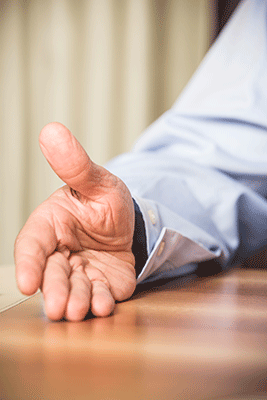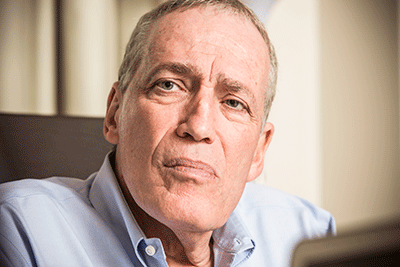By Peter Hossli (text) and Pascal Mora (Photos)

He has saved the lives of thousands. Rivkind, who is being interviewed while having breakfast at the Hotel St. Gotthard in Zürich, is an emergency surgeon in Jerusalem. “We prepare ourselves for having to deal with many victims”, he says. There is currently a new wave of violence drifting over Israel. And yet, Rivkind remains placid. His credo: “I believe in life and I am doing everything in order to preserve it”.
Just how is he doing that? “What I do is, I fight against death”, explains the doctor. He is Head of the Shock Trauma Unit at the Hadassah Medical Center, one of the biggest medical institutions in the Middle East. Those who are badly injured are in good hands with him. The Hadassah Hospital has one of the highest survival rates for their patients who have life-threatening injuries, and a survival rate which is higher than in many British or US hospitals. He also trains surgeons world-wide. “We have an very good staff”, says Rivkin. “The old doctors are the ones who are in authority because experience saves lives”. Being 65 years old, he would like to do surgery “until I am 120”, he says. “My hands are calm, and I improve year by year”.
He holds the surgeon’s knife to treat many things. Car accidents, stab and gunshot wounds, collapses and bomb attacks. He also quite often treats people suffering from heat stroke. “Each case is different, it is not possible to say how exactly one saves lives.” Helping himself to coffee, he says dryly: “I am actually obsessed with life”.

He is a sober-minded man, he speaks English, thoughtfully and with a strong accent. Hebrew is his mother-tongue. His ancestors come from the Ukraine. When he is working in the Operating Room, he considers himself to be “full of energy”, while his demeanor is calm. “If you are a surgeon who is nervous, you contaminate the whole team”.
His smartphone is never set on “silent”. It is there, next to his bed, during the night. “It is always okay, to wake me up for surgery at two o’clock in the morning”, he says. “During my sleep, I am waiting for a call, 365 days of the year”.
During the second Intifada – the Palestinians‘ riot between 2000 and 2005 – 60 percent of his patients were victims of violence. A third Intifada would bring him many more victims, all the more so since the hospital is in Jerusalem and is close to most of the targets of terror attacks. Rivkind treats both Israeli and Palestinians. He never makes a difference between Jewish and Arab life. Last Monday, a 13-year-old Palestinian who been injured by Jewish Settlers was brought to him at the hospital. He had injured a 12-year-old Israeli with a knife. Rivkind received both of them. “We are also saving our enemies”.
Not everybody agrees with that. Recently, there was a Jewish English lady who refused to donate her generous gift to the hospital because of that. Rivkind answered her: “Thank you for your help so far, but we will manage without you”. He may call Palestinians “Terrorists”, but he performs surgery on them, “no matter what they believe”.
When a member of the terrorist organization Hamas had to stay in hospital for over a year, it cost over half a million Swiss Francs to give the man medical treatment. He had been injured during a shooting with the Israeli Army in April 2002 and was forced to lay wounded 12 days in the Nativity Church in Bethlehem. “When he came to us, there were maggots creeping in his intestines”, informs Rivkind. The then 25-year-old smelled like Death itself. “I felt sorry for him”.
Why does he care for humans who hate him, who hate Israel, who want to kill Jews? “We know what sorrow is. Jews have to show humaneness”, says Rivkind. He tells us how his grand-parents died in the Ukraine because of the Holocaust, murdered by the Nazis. His father survived only because he played dead in front of the henchmen.

And yet, Rivkind draws the line between his duty as a medical doctor and his private life. When almost twenty years ago he flew to Argentina with Lufthansa, there was an elderly man aboard whose bladder was blocked. Rivkind inserted an emergency catheter into him which probably saved the man’s life. The patient’s name was Heinz, a German, over seventy years old [back then, in around 1990], who was on his way to a military hospital in Buenos Aires. He was most probably an old Nazi.
To acquiesce to the death penalty
When Rivkind arrived at the hotel in Buenos Aires, the janitor gave him a slip of paper. It was from Heinz who invited him to visit in order to thank him. But Dr. Rivkind would not respond: ‘I may save everyone, but I do not dine with everyone”.
Would he, hypothetically speaking, kill Adolf Hitler after having treated him? “No, I would treat him so that he could participate in a trial against him, in front of a court”. And if this trial would end with a death penalty sentence? “It is hardly acceptable for me if someone is killed”, says Rivkind. “But if the law enforces that sentence, I would yield to and acquiesce in it”.
It was by coincidence that Rivkind became a medical doctor. His father died when Rivkind was 15 years old. In order to be able to enter one of the Israeli Army’s Elite Units, the semi-orphan needed his mother’s consent, which she refused to give. So, instead of going to the front, he joined the Military Police. While investigating the death of a young lieutenant who had died of a headshot, a doctor showed Avi, how he had treated the victim, which medication he had given the patient, and where he had put his surgeon’s knife. “I did not understand a word”, says Rivkind. “It was embarrassing”.
The doctor took time to explain to the young police officer. At last, he offered him a book about anatomy, which opened a whole new world to Rivkind: it made him study Medicine at the Hebrew University in Jerusalem.
Today still, Rivkind is fascinated by every new case. Why? “Because I work in an environment that is characterized by abrupt changes”. It does not matter whether this is caused by a shotgun wound or a car accident: “There are countless question marks, you have to act fast, you have to do the right thing, you have to recognize the problem in an instant and you have to come up with a solution without hesitating for too long. Time is everything”. Is he in control? “When you decide to go in certain way, you stick with it, and it is only after the surgery has been performed that you explain what you have actually done”.
And the goal is supposed to remain the same, always: “I save lives”.
Middle East: At the beginning of a third Intifada?
The spiral of violence in Israel is spinning at a vicious speed. There have been knife attacks for weeks, caused by Palestinians against Israelis. Many interpret these as the beginning of a third Intifada – after the Palestinians’ riots lasting from 1987–93 and from 2000–05. Hadassah, the hospital where Avi Rivkind is working, is in the middle of all this. “The patients come to us with stab wounds”, says Spokesperson Barbara Sofer. “We are prepared to receive numerous victims”. Victims coming from both sides. Last Monday, Palestinian Ahmad Manasra (13) attacked Israeli Naor Shalev Ben-Ezra (12) and injured him with a knife to the point where he was very close to death. An Israeli Settler then run Manasra over with his car. Both boys were brought to the Hadassah hospitals.
Mahmud Abbas (80), the Chairman of the Palestine Liberation Organization, showed a photo of the blood-spattered Ahmad on television, implying Israelis had allegedly killed the boy. Sofer disagrees. “He is being taken care of at our hospital. He is not in deadly peril anymore”. The hospital had the press take pictures and make videos of Ahmad eating in his hospital bed. His victim Naor is also out mortal danger. One thing is for sure: these two boys are the playthings in the propaganda war of an infinite conflict.
